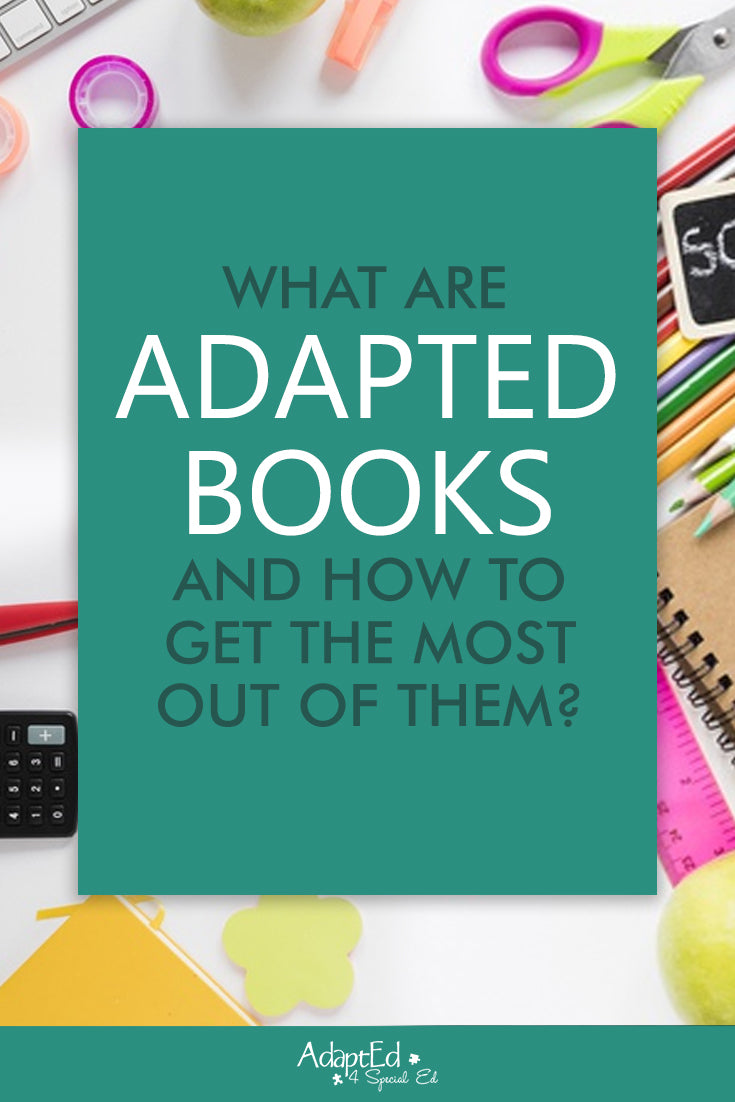Have you ever struggled to understand or do something that everyone else seems to be able to do easily? How did that make you feel?
For most people, this situation may make them feel frustrated, upset, or ready to give up. For children with learning disabilities, this is an everyday occurrence. They may find certain areas of learning, such as reading, understanding instructions, or recognizing patterns or shapes difficult.
This is where adapted books come in.
Using adapted books as part of your child's learning process can help target cross-curricular skills. They help your child do so much more than just learn how to read. They teach skills including math, science, problem-solving, and social skills.
Read on to find out more about adapted books and discover how you can help your child get the most out of them.

What Are Adapted Books?
Simply put, an adapted book is any book that has been modified in some way to better fit the learning needs of your child or student.
These books are an important part of any special education classroom, as they help make learning accessible for children with learning disabilities. Adapted books also allow children to build their social skills as well as develop fine motor skills while learning.
Some examples of common modifications that can be added to books are:
- Larger text
- Braille
- Tactile elements
- Pictures or picture symbols
- Moveable objects or exercises
Why You Should Use Adapted Books
So now you know what adapted books are, it's time to decide if they are right for your child. Generally, if you are finding yourself struggling to engage and motivate your child to keep them focused on reading a book, you should consider using adapted books.
The good news is that they are really easy to use at home as well as in a classroom setting. If you homeschool your child, you could make adapted books a part of your daily timetable or learning structure.
Here are just three of the ways that using adapted books can enhance your child's learning:
1. Improves Concentration
Any child can easily lose focus when doing an activity that doesn't interest them. But for children with learning difficulties, more positive reinforcement is needed to develop and improve their concentration levels.
Adapted books are great for this. Choose books with interactive media elements like lights and striking visuals to picque their attention and help them concentrate on the pages.
2. Develops Reading Comprehension Skills
Books with extra pictures or symbols can help the child develop a better understanding of the wider context of the book. Rather than reading the words: "John played with a red ball," they can actually see a boy playing with the ball. This will keep them more engaged and interested.
Using an accompanying discussion sheet while reading the book can also further build on reading comprehension skills. It will teach them to understand the key wh- questions (who, what, when, where, and why), and to pick out relevant information from a wider text.
3. Builds Up Core Vocabulary
Modifications like additional picture symbols, tactile elements, and supplementary objects can help children better understand certain core words. This is because they will be able to connect a word to a real thing, rather than an abstract concept.
Not every child will be able to visualize the appearance of tree bark or the sound of crunching leaves. Books that include pictures of these things help show the child what it looks like. Better yet, get some samples of these things yourself to allow them to properly examine and feel it.

How to Use Adapted Books to Get the Best Out of Them
Adapted books are a great way to introduce new topics, develop skills, and learn to work independently and with others. You just have to know how to use them to get the best out of them.
Here are our top tips to ensure your child benefits from any session with adapted books.
1. Choose the Right Kind of Book
First, you need to decide what key skills and competencies you want to work on using adapted books. Some books focus on basic life skills or team building work, while others zoom in on a particular feature of language such as verbs or prepositions.
It might take some trial and error to find the right kind of books for your child or class. If you notice that they tend to respond best to books with matching activities or tactile elements, focus more on them when choosing new books.
2. Pair the Book With Another Practical Activity
You want to associate reading adapted books with fun and positive emotions. Try pairing your reading sessions with related activities to help keep your child interested for longer and to help them contextualize the content of the book.
For example, if the book is about a walk in the park, take your child to the park after reading the book. They will be able to feel the textures described in the book and do the same activities as the characters they have read about.
There are lots of activities you could do together following reading. Try acting or miming out some of the events, re-enacting the events through play, or doing some topical arts and crafts.
3. Always Debrief
Always review the book together after finishing it, or completing a few pages. Recap the vocabulary, sounds, or events using worksheets or a discussion sheet.
This will not only improve their reading comprehension, but will build their confidence in reading and sharing their thoughts and feelings about what they have read. If you put the book down without debriefing, you are not making the most of learning from adapted books.
Help Your Child Learn With Adapted Books
It is important to let your child learn in a way that works for them. Adapted books are a great resource, as they can be used to teach a variety of skills in a less formal learning environment.
The best thing is that there are adapted books for every age and subject area, so you can find some that work for your child, whatever their needs. Many adapted books are also available in digital format, allowing you to keep the interactive element whilst also allowing your child to engage with technology.
We hope this article has helped you understand what adapted books are and how they could benefit your child's education. To find books to suit your child's individual needs, visit our website or call us today on (714) 598-9550.



